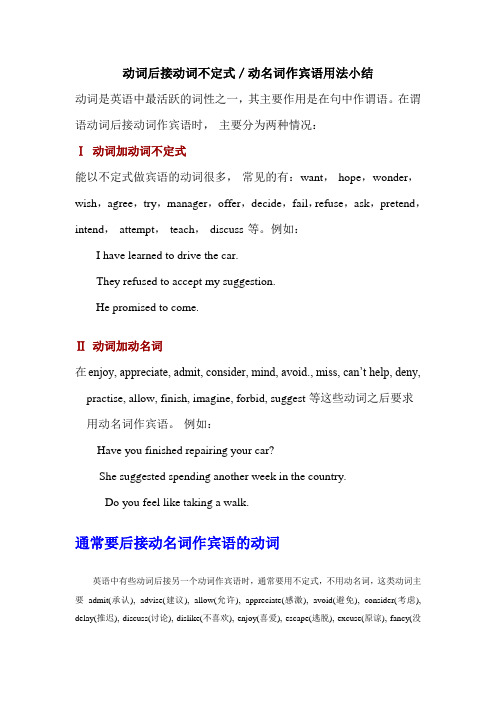哪些动词后面只能接动名词
动词后接动词不定式/动名词作宾语用法小结

动词后接动词不定式/动名词作宾语用法小结动词是英语中最活跃的词性之一,其主要作用是在句中作谓语。
在谓语动词后接动词作宾语时,主要分为两种情况:Ⅰ动词加动词不定式能以不定式做宾语的动词很多,常见的有:want,hope,wonder,wish,agree,try,manager,offer,decide,fail,refuse,ask,pretend,intend,attempt,teach,discuss等。
例如:I have learned to drive the car.They refused to accept my suggestion.He promised to come.Ⅱ动词加动名词在enjoy, appreciate, admit, consider, mind, avoid., miss, can’t help, deny, practise, allow, finish, imagine, forbid, suggest等这些动词之后要求用动名词作宾语。
例如:Have you finished repairing your car?She suggested spending another week in the country.Do you feel like taking a walk.通常要后接动名词作宾语的动词英语中有些动词后接另一个动词作宾语时,通常要用不定式,不用动名词,这类动词主要admit(承认), advise(建议), allow(允许), appreciate(感激), avoid(避免), consider(考虑), delay(推迟), discuss(讨论), dislike(不喜欢), enjoy(喜爱), escape(逃脱), excuse(原谅), fancy(没想到), finish(完成), forbid(禁止), forgive(原谅), give up(放弃), imagine(想像), keep(保持), mention(提及), mind(介意), miss(没赶上), pardon(原谅), permit(允许), practise(练习), prevent(阻止), put off(推迟), report(报告), resist(忍住), risk(冒险), stop(停止), suggest(建议), understand(理解)等。
只接动名词的动词

只接动名词的动词miss失去, mind介意, enjoy喜欢, give up放弃, finish完成, avoid避免, practise实践, escape逃跑, stop停止, excuse原谅, delay耽误, require 要求, suggest建议, insist on坚持, can’t help禁不住, complete完成, deny否认, put off推迟, favor赞成,支持, understand明白, risk冒险, keep保持, consider考虑,imagine想象、猜想,fear 害怕,include 包括,suffer痛苦、遭受,report报告,celebrate庆祝prevent阻止。
等。
有些动词后面即可接-ing又可接不定式即permit, allow, encourage, advise, recommend, forbid等一般用动词-ing结构做宾语,但如有自己逻辑主语时要用不定式。
e.g. 1.They don’t allow smoking in the auditorium.礼堂内禁止吸烟。
2.The doctor advised taking exercise.医生劝告要参加锻炼。
3.We don’t permit talking in class.我们不允许在课堂上讲话。
4.They forbid parking here.这儿禁止停车。
5.He permitted me to arrive late, with an excuse.说明了理由,他允许我来晚了。
6.The teacher forbids us to talk in class.老师允许我们上课讲话。
Two:1. I crossed the street to avoid meeting him, but he saw me and came running towards me.我横穿马路以便避开他,但他看到了我并朝我跑过来。
只能跟动名词的动词

只能跟动名词的动词考虑建议盼原谅;承认推迟没得想。
避免错过继续练;否认完成就欣赏。
禁止想象才冒险;不禁介意准逃亡。
难以忍受始反对;想要成功坚持忙。
习惯放弃有困难;导致专心防道歉。
解析:第一句包含的动词有:consider, suggest/advise, look forward to, excuse/pardon,第二节包含的动词有:admit, delay/put off, fancy,第三句包含的动词有:avoid, miss, keep/keep on, practice,第四句句包含的动词有:deny, finish, enjoy/appreciate,第五句包含的动词有:forbid, imagine, risk第六句包含的动词有:can't help, mind, allow/permit, escape.第七句包含的动词有:can't stand(难以忍受),set about 开始,着手,object to,第八句包含动词有:feel like(想要),succeed in (成功),stick to(坚持) ,insist on(坚持,强调,坚决要求),be busy (in)(忙于做某事)第九句包含的动词有:be used/accustomed to(习惯于……),give up(放弃), have difficulty/trouble (in), (做某事有困难)第十句包含的动词有:lead to(导致), devote to(将…奉献给;把…专用于), prevent……from……(预防,防止),apologize for(为……道歉), ,此外,have a good/wonderful/hard time (in), spend time (in),thank you for, pay attention to, aim at 目的在于,旨在;瞄准;企图,accuse…of…控告;谴责,get down to(着手某事),allow,undesrtand,resist(抵制、抵抗),It's no use doing sth, there is no point (in)doing sth.etc.注意:(1).advise, allow, consider后面不可以接不定式,但可以接不定式做宾语补足语,即:advise/allow/consider sb. to do sth. 建议/允许/考虑某人做某事。
常用来接动名词做宾语的动词

常用来接动名词做宾语的动词哪些动词或短语接动名词是测试中的重点。
往往可分以下两种,现总结如下:①下列动词后常常只能接动名词作宾语:acknowledge承认,自认;advise建议;admit 承认;allow;avoid避免;appreciate感激;bar禁止;cease 停止;consider考虑;confess坦白;delay 延期;deny否认,抵赖;dislike不喜欢,讨厌;enjoy喜欢; escape逃跑;excuse 宽恕;fancy幻想,爱好, imagine想象;include包括、包含;finish完成; complete 完成;forbid禁止;forgive宽恕;imagine想象;mention提到;mind介意、反对; miss错过,想念;keep保持;pardon; 宽恕,原谅practise练习;permit 许可;risk冒险;resist忍住、不屈服于;suggest提议;postpone=put off 延期,推迟;understand理解;favour造成,偏爱; involve卷入,产生某种必然的结果;recall回想;resume恢复;quit放弃、停止;report报告; tolerate 忍受,容忍; hinder耽搁、妨碍;resume继续、重新开始;recommend建议、劝告;等等。
例如:1.In some countries people favor staying together even though there is much more space.在一些国家,尽管有很多空地,人们还是愿意住在一起。
2.With apples at 25 cents a pound, we couldn't resist taking four pounds.由于苹果25分一磅,我们禁不住买了四磅。
3.My mother dislikes seeing you with me. =My mother dislikes our being together.我母亲不喜欢看到你我在一起。
英语中有些动词后面跟动词时

一、动名词1. 英语中有些动词后面跟动词时,只能跟动名词而不能接不定式,这些动词有:admit,acknowledge 承认appreciate 感激,赞赏; consider,考虑avoid 避免complete 完成consider 认为delay 耽误deny 否认detest 讨厌endure 忍受enjoy 喜欢escape 逃脱prevent阻止fancy 想象finish 完成imagine 想象mind 介意 miss(错过) miss 想念postpone 推迟practise 训练recall 回忆resent 讨厌resist 抵抗resume 继续risk 冒险suggest 建议face 面对include 包括stand 忍受understand 理解forgive 宽恕keep 继续例如:Would you mind turning down your radio a little, please?The squirrel was lucky that it just missed being caught.Have you considered going abroad for your education?They don’t want to risk losing their lives.一些动词词组后也只能接动名词:feel like,admit to,prefer…to,be(get) used to, be accustomed to,lead to,devote oneself to,object to,stick to,contribute to, pay attention to,look forward to(to为介词) It's worth…,as well as, be busy, can't help, It's no use /good,be tired of, be fond of, be capable of,be afraid of, be proud of, think of / about,hold off, put off, keep on,insist on, count on / upon, set about, be successful in, succeed in,be good at, take up,give up, burst out, prevent … from…,He is used to living in the countryside.It’s no use talking too much.The joke is so funny that I can’t help laughing.I am tired of working here.2. worth的用法worth,worthy,worth-while 都为形容词。
动词后面只能接动名词和不定式做宾语的顺口溜

1、动词后面只能接动名词做宾语的顺口溜
建议完成多练习(suggest, advise , finish , practice )
避免错过少延期(avoid, miss, delay)
承认喜欢和原谅(admit, enjoy, like ,love, forgive , excuse,pardon)允许想象需欣赏(allow, imagine, appreciate.)
反对逃脱与冒险(mind, escape, risk)
考虑抵制要继续(consider, resist , keep)
厌倦拖延别放弃(be tired of , put off , give up)
期望坚持定成功(look forward to ,insist on, stick to ,succeed in) 2、动词后面只能不定式做宾语的顺口溜
选择目的想申请(choose, aim, want ,wish, hope ,desire, apply)拒绝要求盼决定
(refuse, demand, ask ,beg, expect, decide, determine)
假装许诺同意学(pretend, promise, agree, learn)
主动声称帮安排(offer, claim, help, arrange)
碰巧转身付得起(happen, turn ,afford)
计划威胁未做成(plan ,threaten, fail)
(四川省武胜县乐善中学符小林。
动词后接动名词和不定式作宾语的区别

英语教材里后接动名词和不定式作宾语的动词一、有些动词只能接不定式做宾语。
例如:help,hope,ask,refuse,decide,promise,wish,pretend,expect,learn,plan,manage,agree,fail,offer,happen,seem等等。
例如:He refused to speak on the radio.二、有些动词或短语只接动名词做宾语:mind,finish,enjoy,suggest,consider,miss,keep(on),avoid避开,躲开,stand(忍受),allow ,practicegive up,put off,look forward to期待,期望,feel like想要做某事,prevent…from,阻止can't help禁不住,不由自主迫不及待,be/get used to ,be worth doing,be busy doing例如:His wife doesn't allow smoking inside the room and often advised him to give up smoking.I'm looking forward to hearing from you soon.She doesn't feel like eating anything,being ill for a few days.三、有些动词后面既可接不定式,又可接动名词,其意义基本相同,区别不大。
如;like,love,hate,prefer.begin,start.注意:begin和start本身为进行时,或后面动词为心理变化意义的动词时,须接不定式。
例如:When we came in, they were beginning to have supper.After his explanation, I began to understand it / realize that I was wrong.四、有些词后面既可以接不定式.亦可接动名词,但其意义有很大区别,须特别注意:A.remember,forget,接动名词,表示完成意义(=having done),接不定式,表示将来意义:例如:Please remember to bring me the book I want next time. I remember seeing her(=having seen her) somewhere before.B.mean:mean to do=want to do打算,想要……;mean doing:意味着,就是例如:I am sorry, I didn't mean to hurt your feelings,Learning a foreign languagedoesn't mean just working in class.C.stop:stop to do停下来,要干另一件事,不定式作目的状语;stop doing停止干……,动名词作宾语。
哪些动词后面只能跟动名词

哪些动词后面只能跟动名词?哪些动词后面只能跟不定式?哪些动词后面动名词和不定式都能跟但意思不一样?语法书上也有列举了几十个词像这些 admit, allow, avoid, consider, enjoy, escape, finish, mind, miss, dislike, delay, mean, imagine, permit, practice, resist, risk, suggest, feel like, can’t help, put off, can not understand, give up 请再列举些最佳答案以下动词后,只能跟不定式作宾语 afford (付得起),agree(同意),aim(力求做到), appear(显得),arrange(安排),ask(要求),attempt (试图),care(想要),choose(决定),claim(声称),condescend(屈尊),consent (准许),decide(决定),demand(要求),determine(决心),endeavor (竭力),expect(期待),fail(未履行),help(帮助),hesitate(犹豫),hope(希望),learn(学会),manage(设法),neglect(疏忽),offer(主动提出),plan(计划),prepare(准备),pretend(假装),proceed(接着做),promise(答应),prove(证明),refuse(拒绝),resolve(解决),seem(觉得好像),swear(发誓),tend(往往会),threaten(预示),undertake (承诺),volunteer(自愿做),vow(发誓),want(想要),wish(希望)举例: The driver failed to see the other car in time. 司机没能及时看见另一辆车。
- 1、下载文档前请自行甄别文档内容的完整性,平台不提供额外的编辑、内容补充、找答案等附加服务。
- 2、"仅部分预览"的文档,不可在线预览部分如存在完整性等问题,可反馈申请退款(可完整预览的文档不适用该条件!)。
- 3、如文档侵犯您的权益,请联系客服反馈,我们会尽快为您处理(人工客服工作时间:9:00-18:30)。
喜欢、考虑不可免(enjoy, consider, escape, avoid)
停止,Байду номын сангаас弃太冒险(stop, give up , risk)
反对想象莫推延(mind, imagine, delay, put off)
要求完成是期望(require, finish, look forward to.)
建议继续勤*练(suggest, go on, practise)
不禁原谅要坚持(can’t help, excuse , insist on)
继续注意使成功(keep on, mind, succeed in)
后接动词不定式作宾语的动词口诀记忆一览表
记忆歌诀
解释
例句
要想杜绝“忘记”,
决心努力学习。
希望主动帮助,
答应开始担起。
要想want, need ,拒绝refuse,忘记forget;决心决定decide,determine努力try, manage学习learn;希望hope wish expect long主动愿意offer帮助help;答应agree promise开始begin start担起afford
Can we afford to
buy apartment ?
我们卖得起一套公寓吗?
(河南
